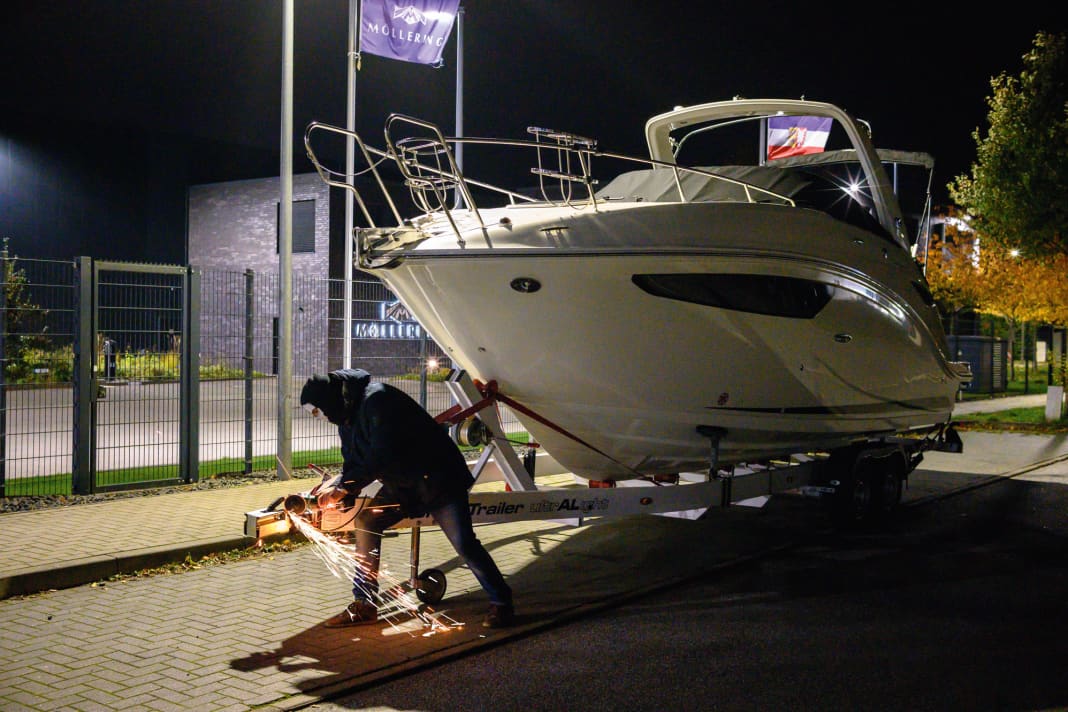




A dark autumn night somewhere in an industrial area. A lone boat and no one to be seen for miles around. No witnesses, no police and no one to hear any noise. The perfect place for a boat theft.
In the darker months of the year, it is much easier for criminals to steal other people's belongings. This is because not every water sports enthusiast has the opportunity to store their trailer, with or without a load, safely in a garage, barn or even a locked car park guarded by cameras when not in use.
These types of trailer locks are available
We use a few examples to show you what to look out for when buying trailer locks and which preventive measures make sense and which are rather pointless.
In addition to the well-known box lock, there are many other options on the market for securing the trailer. From a steel cable that is pulled through the wheel rims to a wheel claw and GPS trackers that sound the alarm as soon as the trailer moves. However, the most widely used securing method is and remains the lock on the towing head. But here, too, there are various ways of protecting the trailer from unauthorised access. However, even the best box lock is useless if the padlock is of inferior quality. A simple U-lock is much easier to pick than a high-quality disc lock from a well-known manufacturer.
One way of protecting the trailer against theft is to block or lock the coupling head. The variants here range from the cheap lockable ball, which is inserted from below in place of the coupling head, to the box lock and much more solid variants, which offer considerably more security.
With the former securing option, however, it is important to bear in mind that the towing jaw is often very greasy. As a skipper, you almost always have grease on your fingers when you go on board afterwards. Another drawback is when you want to secure the trailer to the towing vehicle in the car park. Due to the blocked opening, into which the ball head actually engages, further securing to the vehicle is not possible. However, many box locks now make it possible to lock the trailer even when it is coupled. A car with a trailer is much more conspicuous and more difficult to steal. You should also always make sure that the towing head cannot be removed with two simple spanners. Because then even the most expensive lock is quickly unscrewed and therefore useless. Or you can use this variant directly as further theft protection and remove the towing head.
A boat theft should not be underestimated
But time does not stand still for criminals either. Today's possibilities of destroying trailer locks quickly, but with a lot of noise, using an Akkuflex should not be underestimated. A simple U-lock can be cut within a few seconds, and the resulting noise may be drowned out by the hum of a lorry driving past. In this case, disc locks at least offer more material and less attack surface, where an angle grinder can be easily applied. Even better are box locks that have the lock integrated and therefore do not require an additional padlock, or a variant in which the disc lock is located in a protected cage.
Also interesting:
Another security option is wheel clamps, which protect the tyres from being pulled away from the front or rear. With wheel clamps, however, you should make sure that at least some of the wheel bolts are concealed and inaccessible to the lawbreakers. Professionals may have a spare wheel with them, quickly place a jack under the trailer, remove the secured wheel and install the spare wheel they have brought with them. A process that can be completed within 2 to 3 minutes. Another protective measure is to pull a sturdy steel cable through the wheels on both sides of the axle to prevent the wheels from turning.
Test the lock before first use
Another important aspect is to test the lock you have purchased before using it for the first time. Almost all of the locks we ordered for this report did not fit over the large Alko towing head, for example. So once you are at the slipway and want to go boating, the likelihood of getting a high-quality replacement lock quickly is very low. Conclusion: Don't save money at the wrong end. There is no such thing as the perfect and 100% secure lock. However, there are many ways to make it more difficult for thieves. If the trailer is parked for a longer period of time, it can therefore be useful to protect it against theft with several different locks. Because here too, a lot helps a lot. After all, anything that takes a long time harbours the risk of being caught. It is therefore best to forget the cheapest and often the least secure option. If you want to secure your expensive boat properly, you also need to spend a few euros more on the lock. Another thought-provoking point: During the time we took the photos, seven vehicles drove past the test site. Nobody stopped or even called the police, even though we were clearly tampering with the trailer with a balaclava and an angle grinder.
Conclusion
Don't save at the wrong end. Protect trailers against theft with several different types of security. If you want to secure your expensive boat properly, you need to spend a few euros more on the lock.

